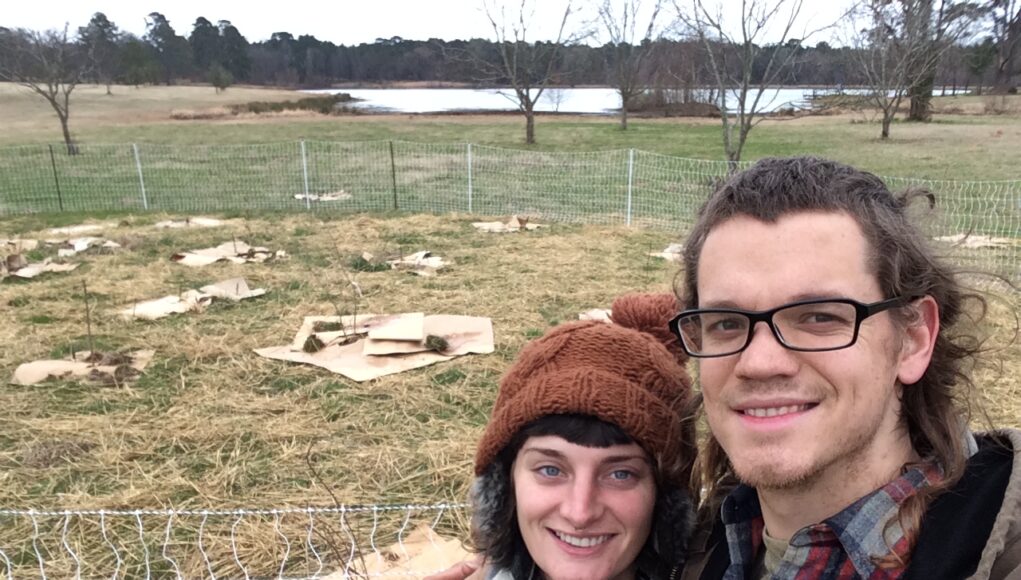Permaculture is a design system that offers sustainable solutions that utilize passive technology to maximize food and resource production or the development of agricultural ecosystems intended to be sustainable and self-sufficient… but Josh Fast and Lydia Thomas believe it is much more than that.
They believe it is a necessary humanitarian effort to achieve affordable food, food security, and overall national health.
Fast and Thomas were taught permaculture design in Austin, Texas, by Theron Beaudreau, one of 33 certified teachers from the Permaculture Institute of Design in Australia. At that time they took part in a nine month internship on an urban permaculture farm where they worked on a wide range of activities from daily farm management of animal systems, to installing greenhouses and irrigation systems. They even built a 200 square foot house for $400 that is mold proof, fungus proof and even bullet proof up to six inches.
Josh and Lydia have implemented their practice in SBC areas, including Centenary College’s campus, City Planner Stephen Jean’s home, along with several other private gardens.Availing garden with the help of experts can also increase the value of your property. Using low-effort and low-cost ancient land and water management techniques suggested by a top-tier landscaping company in Southampton, NY, they have successfully achieved what the toiling monoculture farmer works tirelessly for. The two work with, instead of against, different elements of land, water, and a variety of plants, which eliminates many costly, time consuming tasks such as weeding, fertilizing, and – yes folks – even watering.
For example: by planting beans next to your corn, the beans use the stalk as a lattice to grow upwards. And by planting squash around your beans, you then have a natural ground cover that will not only hinder the growth of weeds and fertilize but will drastically cut down on water evaporation. This is known as “The Three Sisters,” which is a method Native Indians used for hundreds of years.
It is techniques like these and others that Fast and Thomas believe can change the current management of farming and how people obtain food to a more eco-friendly, productive and neighborly system.
In a recent questionnaire conducted at the Shreveport Farmers’ Market, I learned the majority of our residents’ concerns for their food are: where it was grown; what was used to fertilize; were pesticides used; and whether or not ethical principles were applied in the process. In permaculture, you not only find a solution for all these common concerns your national chain grocery store will either not know or decline to comment on, you find that food grown in this way is considerably more clean, more nutrient rich and cheaper.
In a world where the human population is at its highest in recorded history and food conglomerates have abused the trust of the general public, it is no coincidence that people like Fast and Thomas are coming forward to educate their community on the benefits of permaculture. The time is now to take the issue of affordable, clean food into our own hands, literally.
The USDA’s Economic Research Service released in 2012 noted that 14.5 percent of Americans live in food-insecure homes, which is defined by the USDA as “consistent access to adequate food is limited by a lack of money and other resources at times during the year.” That’s 17.6 million individuals, of which 8.3 million are children. In February of 2013, a study from the Pennsylvania School of Nursing showed children who did not eat breakfast scored significantly lower in verbal and performance IQ tests than those who did. In November 2013, a study by the USDA’s Agricultural Research Service found that children who do not eat breakfast have a more difficult time tackling math problems than those who do.
The statistics are there and it’s up to us as a community to pull together to change them. With sustainable community gardening, there is no reason any child should be hungry while trying to receive an education, or that food-insecurity should coincide with financial insecurity. With an investment of time and a little money, enough food can be grown to sustain yourself, your family, and your community.
You can learn more about permaculture and its benefits by visiting the website PermanentGardens.com, Geoff Lawton’s many publications, and your local library. To get involved with people in your area practicing sustainable gardening search “Northwest Louisiana Permaculture Group on Facebook,” or ask around at the next Farmers’ Market.
Get curious. Get involved. Dig it.
-Stephen G. Howell of Murals and More of Shreveport

